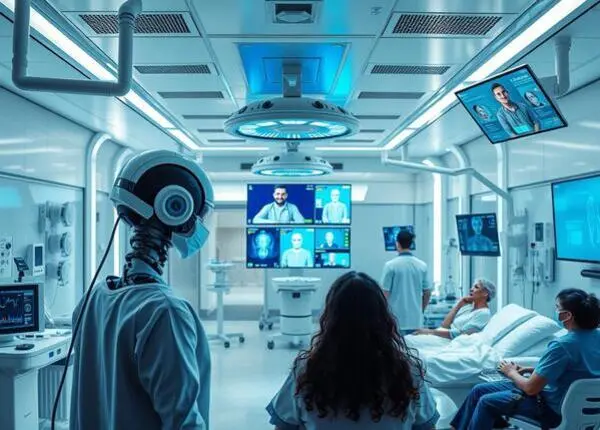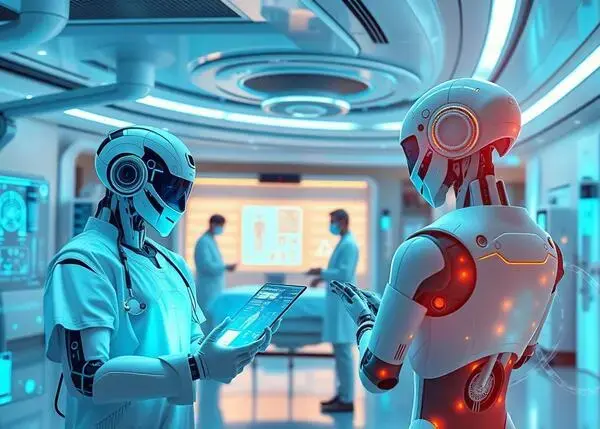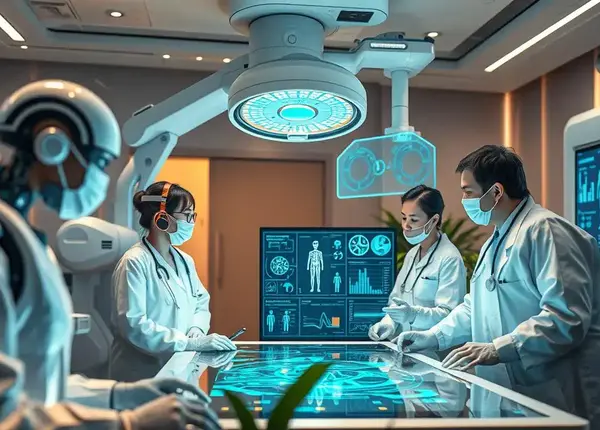The healthcare world is changing fast, thanks to AI companies leading the way. As we move into 2024, AI is changing how we get medical care. It’s making things better for patients and making things run smoother. Medical AI technology is bringing big changes in how we diagnose and treat patients. This is making healthcare better and more efficient. It’s a big step forward for the industry.

Now, technology is key in healthcare. It lets doctors use new solutions that make care better and save money. This shows how big an impact AI is having on healthcare. It’s making sure care is more precise, easy to get, and efficient.
Key Takeaways
- The role of AI healthcare companies is increasingly critical in transforming healthcare delivery.
- Artificial intelligence in healthcare leads to enhanced patient experiences and outcomes.
- Innovative medical AI technology is reshaping diagnostics and treatment options.
- Healthcare technology innovation drives cost efficiencies and operational improvements.
- The convergence of AI and healthcare is creating a new era of medical care.

Here some of the leading providers of AI technology in health care?
Artificial Intelligence (AI) is revolutionizing the healthcare industry, making diagnosis faster, treatments more personalized, and care more efficient. From aiding in medical imaging to improving drug discovery, AI technologies are rapidly transforming how healthcare professionals approach patient care. In this article, we will explore some of the leading providers of AI technology in healthcare, showcasing companies that are pushing the boundaries of what AI can achieve in this vital sector.
IBM Watson Health: A Pioneer in AI Healthcare
IBM Watson Health is one of the most prominent ai healthcare companies. Watson Health’s AI tools are used across various healthcare sectors, including oncology, genomics, and patient management. One of its most notable achievements is its AI-driven oncology platform, which has helped reduce cancer diagnosis time by up to 25%. Additionally, 90% of the top hospitals in the U.S. use IBM Watson’s AI for treatment recommendations and research.
One of the most impressive aspects of IBM Watson Health is its ability to process unstructured data, such as clinical notes and medical literature. By doing so, it can provide clinicians with insights that were previously difficult to obtain, leading to improved diagnosis and treatment planning.
Google Health: Bringing AI to Healthcare
Google Health, through its DeepMind division, has made significant strides in healthcare AI. Its AI model for detecting diabetic retinopathy boasts an impressive 87.5% accuracy, outperforming many human ophthalmologists. Google’s AI also detected breast cancer with a 5.7% lower false positive rate compared to traditional methods. By 2023, Google Health’s AI solutions were used by over 100 hospitals globally for diagnostics and research.
Google Health’s work has been particularly revolutionary in medical imaging. Its AI algorithms can quickly and accurately analyze medical scans, helping doctors detect abnormalities in a fraction of the time it would take manually. As a leading provider of AI technology in health care, Google is pushing forward with groundbreaking projects that could improve patient outcomes globally.
Philips Healthcare: AI-Powered Medical Imaging
Philips Healthcare has been a leader in medical imaging for years. Its AI-powered imaging technologies, such as Philips IntelliSite Pathology Solution, have reduced pathology turnaround times by 30%. Philips’ AI technologies have also improved cancer detection rates by 15-20% in certain applications. Today, Philips’ AI-powered imaging solutions are used in over 3,000 healthcare institutions worldwide.
Philips’ AI-powered imaging solutions have been instrumental in improving the speed and accuracy of cancer diagnoses, providing personalized care for patients. As one of the top AI healthcare companies, Philips continues to innovate in areas like imaging, diagnostics, and patient monitoring.
GE Healthcare: Advancing Precision Medicine with AI
GE Healthcare is another major player in the AI space, particularly in precision medicine. Its Edison AI platform has enabled 60% faster image processing for radiologists, allowing for quicker diagnosis of critical conditions. GE Healthcare’s AI technology is used in more than 50 countries, impacting millions of patients globally. Their AI solutions are projected to reduce diagnostic errors by up to 44%, enhancing patient outcomes significantly.
GE Healthcare’s AI tools are also used in medical imaging, where they help radiologists interpret scans more accurately. With a commitment to improving patient outcomes through data-driven insights, GE is one of the top AI healthcare companies making significant contributions to the field.
Nuance Communications: AI in Clinical Documentation
Nuance Communications has revolutionized clinical documentation with its Dragon Medical One platform, which uses AI for speech recognition. This platform is used by 500,000 physicians globally and has been shown to save 2 hours per physician per day in documentation time. This AI-driven tool improves the accuracy of medical records by over 99%, reducing errors and improving patient safety.

Nuance’s technology enhances patient care by reducing physician burnout and ensuring that critical information is accurately recorded and easily accessible. As one of the artificial intelligence healthcare companies focused on clinical workflows, Nuance is transforming the way healthcare providers manage patient records and information.
PathAI: AI-Driven Pathology
PathAI is a leader in AI-powered pathology, using machine learning to assist pathologists in diagnosing diseases like cancer. PathAI’s technology improves diagnostic accuracy by 13% and helps reduce human error in pathology by 25%. It is now being used in clinical trials with leading hospitals and research organizations, positioning PathAI as one of the most trusted AI in healthcare companies.
By leveraging AI, PathAI aims to reduce human error and provide more consistent results. PathAI’s technology is already being used in clinical trials and hospitals to assist doctors in making better-informed decisions, positioning it as one of the top AI healthcare companies in the pathology space.
Tempus: AI for Precision Medicine
Tempus specializes in precision medicine, using AI to collect and analyze molecular and clinical data to personalize cancer treatments. Tempus processes more than 50,000 patient samples a month, using AI to offer oncologists real-time data on the best treatment options. Their AI-driven analyses help reduce the time to find effective treatments by 35%, making it one of the top medical AI companies advanced diagnostics cancer care.
Tempus allows for more precise and effective treatment options for patients. Tempus is a top name among medical AI companies working to advance personalized healthcare solutions through artificial intelligence.
Aidoc: AI for Radiology
Aidoc focuses on AI-driven radiology, assisting in the detection of critical conditions like strokes and aneurysms. Aidoc’s AI algorithms are able to reduce scan interpretation time by 35%, improving outcomes in emergency care settings. By 2023, Aidoc’s solutions were deployed in over 1,000 hospitals globally, helping radiologists prioritize and diagnose urgent cases more effectively.

By automating some of the diagnostic processes, Aidoc helps healthcare professionals provide faster, more accurate care to patients. As one of the leading providers of AI technology in healthcare, Aidoc is setting the standard for AI-driven diagnostics in radiology.
FAQ
What are the top AI healthcare companies?
AI healthcare innovations companies use artificial intelligence to improve healthcare. They create solutions that help patients, make diagnoses better, and make healthcare work more smoothly.
How is artificial intelligence healthcare companies?
Artificial intelligence healthcare companies use AI technologies to improve diagnostics, personalize treatments, and automate administrative tasks. Their AI-driven solutions help detect diseases more accurately, create tailored treatment plans, and enhance overall efficiency in healthcare systems.
What are some applications of AI in healthcare?
AI helps in healthcare by watching over patients, making diagnoses, and talking to patients online. It also automates paperwork, cutting costs and speeding things up.
What benefits does AI provide in medical technology?
AI in healthcare brings many benefits. It leads to better patient care, makes things run smoother, cuts costs, and helps make diagnoses more accurate. It also helps with quick decisions, keeps patients healthy, and makes medicine more personal.
What role do healthcare AI startups play?
Healthcare AI startups are key to innovation. They create new AI solutions for healthcare, offering the latest technology to improve patient care and make healthcare work better.
How are AI healthcare companies viewed by investors?
Investors see a lot of potential in healthcare AI. They’re putting a lot of money into AI healthcare companies. This money helps develop new tech and grow existing ones, making healthcare better.
What are the trends shaping healthcare technology innovation?
Trends in healthcare tech include more online doctor visits, using machines to help with diagnoses, predicting patient care needs, and using AI for managing patients.



